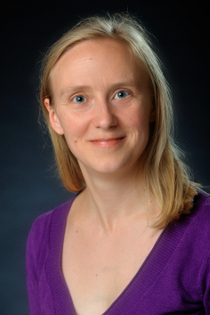Foltz, Anouschka, Assoz. Prof. Dr. phil. M.A. M.A.

Anouschka Foltz ist Assoziierte Professorin für Englische Sprachwissenschaft am Institut für Anglistik der Universität Graz. Sie ist seit Juli 2018 am Institut und hat 2021 mit ihrer Habilitationsschrift mit dem Titel "Enablers and barriers in langauge and communication: insights from alignment, processing and acquisition" die Lehrbefungnis in Sprachwissenschaft mit besonderer Berücksichtigung der Englishen Sprache erlangt. Bevor sie nach Graz kam, war sie Dozentin für Psycholinguistik an der Bangor University in Wales.
Forschungsinteressen
Ihre Forschung liegt auf dem Gebiet der Psycholinguistik, mit einem Fokus auf der Sprachverarbeitung bei Erwachsenen als auch auf den Spracherwerb in L1 und L2. Ihre Hauptinteressen liegen in der prosodischen und syntaktischen Sprachverarbeitung. Ein Forschungsschwerpunkt liegt beim syntaktischen Priming bei Kindern und Erwachsenen. Die andere Forschungsrichtung befasst sich mit kontrastiven Tonhöhenakzenten in der Diskursverarbeitung. Sie interessiert sich auch für Sprachrechte und den Zugang zur Sprache.
Drittmittelprojekte
Laufend:
Wales Public Health Grant
Co-PI on project “Scoping Study: Health and Deafness in Wales Survey”. Gefördert bis zum Wert von £10,000.
Wales School for Social Care Research Capacity Building Small Grant
Co-PI on project “Parenting classes in BSL: Developing culturally-sensitive learning materials”. Gefördert bis zum Wert von £9,979.
Bisherige:
Welsh Crucible Small Grant
Co-PI on project “Communicating the complexities of climate change”. Gefördert bis zum Wert von £6,200.
"Science to public" Veröffentlichungen
- Foltz, A. (2020). How we predict upcoming words when we listen to a native and second language. OASIS Summary of Foltz, A. (2020) in Studies in Second Language Acquisition. https://oasis-database.org/concern/summaries/k930bx19j?locale=en
- Foltz, A. (2020). Children represent at least some grammar abstractly before the age of three. Kudos Summary of Foltz, A., Knopf, K., Jonas, K., Jaecks, P., & Stenneken, P. (2020) in First Language. https://www.growkudos.com/publications/10.1177%25252F0142723720905919/reader?utm_source=TrendMD&utm_medium=cpc&utm_campaign=Kudos_TrendMD_0
- Foltz, A. (2020). Clocking your work. Science, 368(6490), 542-542.
- Foltz, A. & Shank, C. (2019). Accessing healthcare is challenging for Deaf people – but the best solution isn’t ‘one-size-fits-all’. The Conversation, November 28. Available at: https://theconversation.com/accessing-healthcare-is-challenging-for-deaf-people-but-the-best-solution-isnt-one-size-fits-all-127734.
- Foltz, A. (2019). Sign languages are fully-fledged, natural languages with their own dialects - they need protecting. The Conversation, January 28. Available at: https://theconversation.com/sign-languages-are-fully-fledged-natural-languages-with-their-own-dialects-they-need-protecting-109388.
- Foltz, A. (2016). On her first birthday, Princess Charlotte already knows much about language. The Conversation, May 2, 2016. http://theconversation.com/on-her-first-birthday-princess-charlotte-already-knows-much-about-language-57005.
- Foltz, A. (2015). When languages die, we lose a part of who we are. The Conversation, December 9, 2015.
- https://theconversation.com/when-languages-die-we-lose-a-part-of-who-we-are-51825.
Doktorand*innen
Bisherige Doktorand*innen:
Alaa Alahmadi: The role of learning strategies in vocabulary acquisition (Abschluss: 2020)
Amirah Saud A. Alharbi: First language attrition and second language acquisition: Exploring the role of phonetic aptitude and langauge use in highly proficient late Arabic-English and English-Arabic bilinguals (Abschluss: 2020)
Jen Lewendon: Two languages, one mind: How accent and lexical stress modulate bilingual language activation (Abschluss: 2020)
Aktuelle Doktorand*innen:
Nika Barišić Ičanović: False friends in the process of second language acquisition – measuring error ratio during English - German and German - English false friend interpretation
Anouschka Foltz
Institut für Anglistik8010 Graz, Heinrichstraße 36/II

